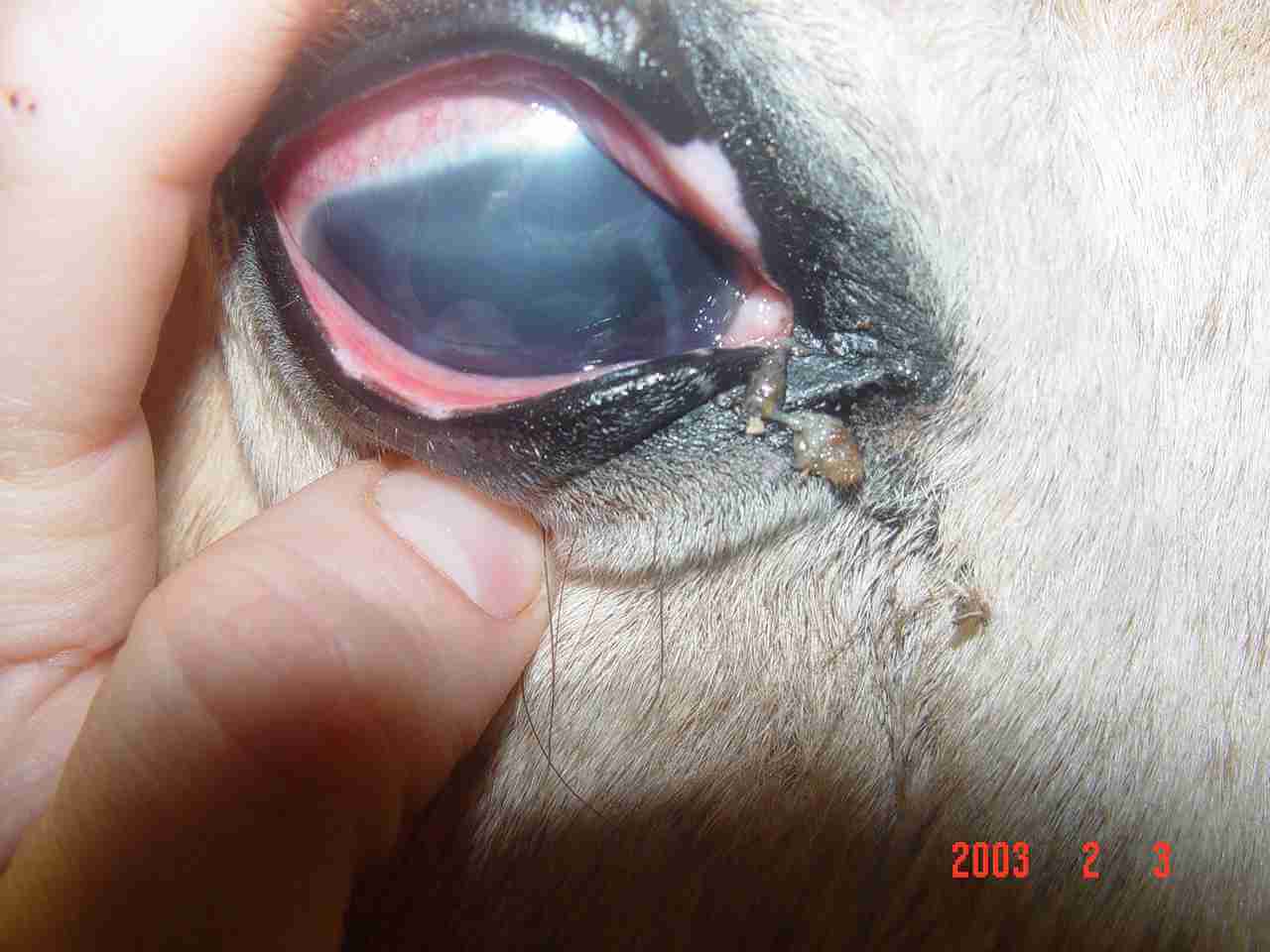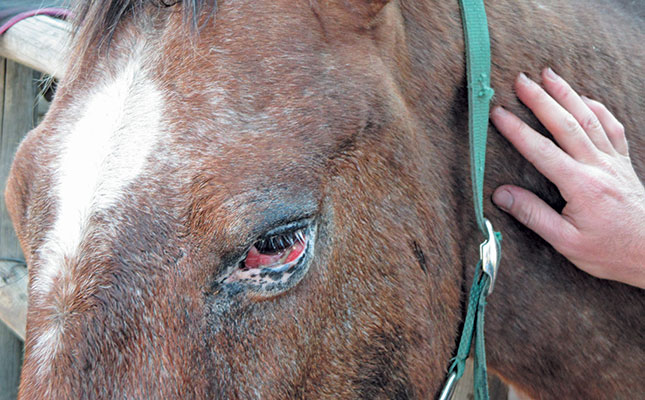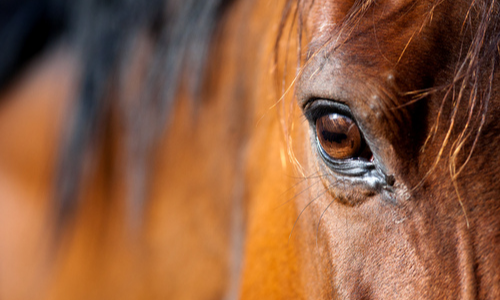Eye infections in horses can cause discomfort, pain, and potential vision loss. They require immediate veterinary attention and treatment to prevent complications.
Eye infections are a common concern among horse owners and can be caused by various factors such as bacteria, viruses, or allergens. These infections can result in symptoms like redness, swelling, discharge, and sensitivity to light. It is crucial to address eye infections promptly to avoid further complications and preserve the horse’s vision.
Veterinary treatment may involve applying topical medications, administering oral antibiotics, or in severe cases, surgery. In addition to medical intervention, proper hygiene practices, such as regular cleaning of the horse’s face and avoiding irritants, can help prevent eye infections. Understanding the signs, causes, and treatments of eye infections in horses is vital for horse owners to ensure the wellbeing and visual health of their equine companions.

Credit: nouvelleresearch.com
Understanding Eye Infections In Horses
Eye infections in horses can be a common problem affecting their overall health. Understanding the causes and symptoms of these infections is crucial for timely treatment and prevention.
Understanding Eye Infections in Horses Eye infections can be a common and concerning issue for horse owners. Just like humans, horses are susceptible to a variety of eye infections that can cause discomfort and potential complications if left untreated. It is important for horse owners to have a basic understanding of eye infections in horses, including their causes, signs and symptoms, as well as prevention and treatment options. Common Causes of Eye Infections There are several factors that can contribute to the development of eye infections in horses. Understanding these common causes can help horse owners take proactive measures to prevent them. Some of the common causes of eye infections include: 1. Trauma: Any form of trauma to the eye, such as scratches, foreign objects, or blunt force impact, can create an entry point for bacteria, viruses, or fungi to cause an infection. 2. Environmental factors: Dust, debris, allergens, or irritants present in the horse’s environment can cause eye irritation and make the eye more susceptible to infections. 3. Inadequate eye hygiene: Neglecting proper eye hygiene, such as failure to clean the eyes regularly or using contaminated materials, can increase the risk of eye infections. Signs and Symptoms of Eye Infections Detecting eye infections in horses early on is crucial for prompt diagnosis and treatment. It is essential for horse owners to be aware of the signs and symptoms that may indicate an eye infection. Some common signs and symptoms include: 1. Excessive tearing or discharge from the eye that is thick, cloudy, or discolored. 2. Redness and swelling around the eye. 3. Squinting or blinking excessively. 4. Sensitivity to light. 5. Excessive rubbing or pawing at the eye. Prevention and Treatment of Eye Infections Preventing eye infections in horses involves implementing good hygiene practices and being proactive in monitoring the horse’s health. Here are some prevention and treatment measures that can help: 1. Prioritize cleanliness: Regularly clean the horse’s face and eyes using a gentle, non-irritating cleanser. Use clean towels or disposable wipes for each eye to prevent cross-contamination. 2. Minimize exposure to irritants: Keep the horse’s environment clean and free from dust, debris, and potential irritants that can cause eye infections. 3. Seek veterinary care: At the first sign of an eye infection, it is important to contact a veterinarian for a thorough examination and appropriate treatment. 4. Administer prescribed medications: Follow the veterinarian’s instructions carefully when administering any prescribed medications, including eye drops or ointments, to ensure effective treatment. 5. Monitor and observe: Regularly observe the horse’s eyes for any changes or abnormal signs, and consult a veterinarian if any concerns arise. Taking proactive measures to prevent eye infections in horses can significantly reduce the risk and potential complications. By understanding the common causes, recognizing the signs and symptoms, and seeking prompt veterinary care, horse owners can ensure the health and well-being of their equine companions. Remember, a healthy horse means bright, clear eyes and a happier, more comfortable ride.
Credit: www.farmersweekly.co.za
:strip_icc()/horse-eye-resized-56a4dbf03df78cf77284fe95.jpg)
Credit: www.thesprucepets.com
Frequently Asked Questions On Eye Infections In Horses
What Is The Best Treatment For Horse Eye Infection?
The best treatment for a horse eye infection is to consult with a veterinarian who can prescribe specific medication like antibiotics or ointments. They will assess the severity of the infection and provide appropriate treatment to relieve symptoms and promote healing.
How Do You Know If Your Horse Has An Eye Infection?
Common signs of a horse eye infection include redness, swelling, discharge, sensitivity to light, and rubbing of the eye. If you notice any of these symptoms, consult a veterinarian for proper diagnosis and treatment.
What Is The Most Common Cause Of Eye Problems In Horses?
The most common cause of eye problems in horses is Equine Recurrent Uveitis (ERU), also known as Moon Blindness. It is an inflammatory condition that affects the horse’s uvea, causing recurrent episodes of pain, redness, and cloudiness in the eye.
Early detection and prompt treatment are crucial for managing this condition.
What Does Conjunctivitis In Horses Look Like?
Conjunctivitis in horses appears as redness, swelling, and discharge in their eyes. It can also cause squinting, sensitivity to light, and increased tear production.
Conclusion
It is crucial for horse owners to understand the importance of early detection and proper treatment of eye infections in horses. By recognizing the common signs and symptoms, implementing good hygiene practices, and seeking veterinary care promptly, the risk of complications and potential vision loss can be minimized.
Remember, the eyes are a precious and delicate part of a horse’s overall health and wellbeing. So stay vigilant and prioritize their ocular health.


